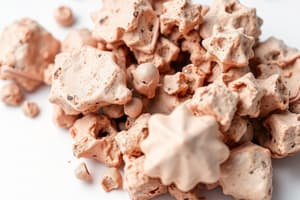Podcast
Questions and Answers
Which of the following is an example of an extensive property of matter?
Which of the following is an example of an extensive property of matter?
- Color
- Smell
- Composition
- Density (correct)
Which of the following is an example of an intensive physical property of matter?
Which of the following is an example of an intensive physical property of matter?
- Density (correct)
- Smell
- Composition
- Color
What is the difference between extensive and intensive properties of matter?
What is the difference between extensive and intensive properties of matter?
- Extensive properties depend on the amount of matter, while intensive properties do not. (correct)
- Extensive properties change with temperature, while intensive properties do not.
- Extensive properties are physical, while intensive properties are chemical.
- Extensive properties are observable, while intensive properties are not.
Which of the following is an example of an extensive property of matter?
Which of the following is an example of an extensive property of matter?
Which of the following is an example of an intensive property of matter?
Which of the following is an example of an intensive property of matter?
Which of the following is a general property of matter?
Which of the following is a general property of matter?
Which of the following is a quantifiable property of matter?
Which of the following is a quantifiable property of matter?
Physical and chemical properties are not the only way to classify properties of matter. They can also be classified according to ______
Physical and chemical properties are not the only way to classify properties of matter. They can also be classified according to ______
Intensive properties are ones that do not depend on the amount of matter present. For example, think about a small orange and a large one. What is the same about them. Probably the color, composition, flavor, texture, or ______
Intensive properties are ones that do not depend on the amount of matter present. For example, think about a small orange and a large one. What is the same about them. Probably the color, composition, flavor, texture, or ______
Extensive properties are those that depend on the amount of matter present. What is the difference between the oranges. Definitely the size, weight, length, width, area or surface, volume, and ______
Extensive properties are those that depend on the amount of matter present. What is the difference between the oranges. Definitely the size, weight, length, width, area or surface, volume, and ______
Intensive properties are very useful for identifying ______ compounds.
Intensive properties are very useful for identifying ______ compounds.
General properties of matter are those that all objects have, regardless of whether they are fruit, objects, elements, people, and so on. The most common examples are mass, volume, ______ (the tendency to remain in a state of rest or in motion), elasticity, porosity, divisibility, and impenetrability.
General properties of matter are those that all objects have, regardless of whether they are fruit, objects, elements, people, and so on. The most common examples are mass, volume, ______ (the tendency to remain in a state of rest or in motion), elasticity, porosity, divisibility, and impenetrability.
Mass is a property that is quantifiable using scales and units of measurement such as grams or ______.
Mass is a property that is quantifiable using scales and units of measurement such as grams or ______.
To obtain the area, two dimensions must be measured (length and width of an object); on the other hand, volume is obtained by measuring the three orientations of an object (height, length, and ______).
To obtain the area, two dimensions must be measured (length and width of an object); on the other hand, volume is obtained by measuring the three orientations of an object (height, length, and ______).
The melting point is the temperature at which an element turns into a ______.
The melting point is the temperature at which an element turns into a ______.
The boiling point is the temperature at which a substance boils and changes from ______ to gas.
The boiling point is the temperature at which a substance boils and changes from ______ to gas.
Density is the amount of matter in a certain ______.
Density is the amount of matter in a certain ______.
The refractive index is the ratio of the speed of light in a vacuum to the speed of light in the ______ whose refractive index is being calculated.
The refractive index is the ratio of the speed of light in a vacuum to the speed of light in the ______ whose refractive index is being calculated.
Viscosity is the resistance of an object to ______.
Viscosity is the resistance of an object to ______.
Which property of matter depends on pressure and varies with geographic location?
Which property of matter depends on pressure and varies with geographic location?
Which property of matter is the resistance of an object to flow?
Which property of matter is the resistance of an object to flow?
Which property of matter is the amount of matter in a certain volume?
Which property of matter is the amount of matter in a certain volume?
Which property of matter is the ratio of the speed of light in a vacuum to the speed of light in a medium?
Which property of matter is the ratio of the speed of light in a vacuum to the speed of light in a medium?
Which property of matter is the temperature at which an element turns into a liquid?
Which property of matter is the temperature at which an element turns into a liquid?
Flashcards are hidden until you start studying




